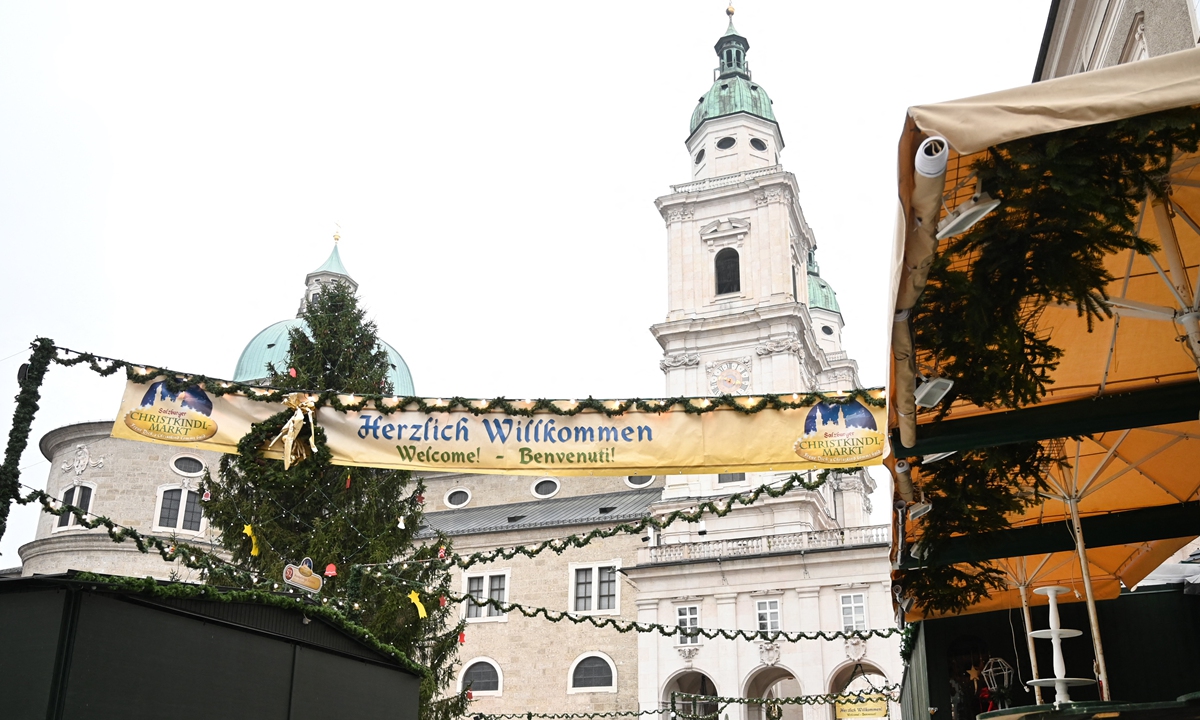
Empty stands are seen at the closed Christmas Market in front of the Cathedral in Salzburg, Austria on November 22, 2021, as the country returned to a nationwide partial lockdown during the ongoing COVID-19 pandemic. Austria is also imposing a sweeping vaccine mandate starting February 1. Photo: AFP
Hurling fireworks and setting fire to vehicles, thousands of people have taken to the streets in Europe recently to protest against reinforced COVID-19 measures as a new wave of the virus sweeps through the continent. Worse may yet be to come as winter and the Christmas festive season could boost infections, Chinese observers warned.
Cases are rising sharply in much of Europe with countries like the Netherlands and Austria reporting a record number of daily infections. Austria became the first country in western Europe to reimpose a lockdown, and in the Netherlands, social distancing became mandatory again on Wednesday despite protests in a number of cities against the COVID-19 measures.
The Netherlands’ health officials reported on Tuesday a 40 percent increase in coronavirus infections, and the soaring number of patients has put a strain on hospitals, some of which have had to transport their COVID-19 patients across the border to Germany, media reports said.
The situation is worrying Chinese overseas students. Evan Chen, a Chinese student in the Hague, told the Global Times on Wednesday that local people only started to wear masks again very recently, and many Chinese students are worried that the worsening pandemic situation may make it impossible for them to go back to China.
They are also anxious about their personal safety amid the chaos and violent protests, Chen said.
Over the weekend, hooded rioters set fire to bicycles in The Hague, as riot police used horses, dogs and batons to chase the crowds away, the BBC reported.
Wang Guangfa, a respiratory disease expert at Peking University First Hospital, told the Global Times on Wednesday that the surge of infections in Europe was mainly because of insufficient prevention measures, combined with winter weather in which the Delta variant can spread faster.
“There is no doubt that the upcoming holidays for Christmas and New Year will lead to a faster spread of the disease in Europe,” Wang said, noting that China is likely to face severe risks of importing infections at that time.
The European Centre for Disease Prevention and Control (ECDC) also warned of challenging times during winter. ECDC Director Andrea Ammon said in a statement sent to the Global Times on Wednesday that recent modeling scenarios run by the ECDC indicated that the potential burden of disease in the EU from the Delta variant will be very high in December and January unless public health measures are applied now in combination with continued efforts to increase vaccine uptake.
“We need to urgently focus on closing this immunity gap, offer booster doses to all adults, and reintroduce non-pharmaceutical measures,” Ammon said, noting that motivating people to follow the measures is even more important as “we move toward winter and the festive season when more people will travel and gather indoors.”
Currently, less than 70 per cent of the overall population in the EU have been fully vaccinated, which leaves a large vaccination gap that cannot be bridged rapidly and gives ample room for the virus to spread, the ECDC said. The agency said countries should also consider a booster dose for all adults aged 18 and older, with a priority for people above 40 years old.
The seasonality factor affects the whole world, and China just brought under control the recent flare-up that has spread to over half of its provinces and cities in less than a month.
Wang said strict measures were taken to prevent the epidemic affecting the overall Chinese society, and Chinese medical resources were not affected unlike in the West, even though China’s medical level still lags behind that of developed countries.
For Chinese residents, most could continue their work, school and social life amid the prevention measures, Wang said.

